Niche keyword research focuses on finding specific, low-competition keywords that attract a highly targeted audience. By 2025, SEO has shifted toward understanding user intent, making niche keywords crucial for driving conversions and improving ROI. This article reviews seven tools designed to refine your niche strategy, from AI-powered solutions to budget-friendly options.
Key Takeaways:
- KWHero: AI-driven content optimization with pricing starting at $59/month. Ideal for content creators and SEO agencies.
- ZonGuru: Amazon-focused keyword tools starting at $49/month, perfect for e-commerce sellers.
- Ubersuggest: Affordable at $12/month, offering keyword suggestions and competitor analysis for small businesses.
- AnswerThePublic: Visualizes question-based keywords, starting at $11/month, great for content marketing.
- Google Trends: Free tool for identifying trends and seasonal patterns.
- SearchX: Full-service SEO starting at $3,000/month, suitable for businesses needing expert support.
- Semrush: Comprehensive SEO platform with a massive database, starting at $139.95/month, ideal for agencies.
Quick Comparison:
| Tool | Starting Price | Best For | Key Features |
|---|---|---|---|
| KWHero | $59/month | Content creators, agencies | AI-driven insights, clustering, NLP |
| ZonGuru | $49/month | Amazon sellers | Amazon-specific data, product research |
| Ubersuggest | $12/month | Small businesses, beginners | Budget-friendly, easy to use |
| AnswerThePublic | $11/month | Content marketers | Question-based keyword visualization |
| Google Trends | Free | Trend insights | Seasonal patterns, real-time data |
| SearchX | $3,000/month | Businesses needing services | Custom strategies, expert-driven SEO |
| Semrush | $139.95/month | Agencies, established businesses | Comprehensive keyword tools, analysis |
These tools cater to a range of needs – from freelancers to large-scale agencies. Whether you’re targeting specific platforms like Amazon or looking for affordable solutions, there’s a tool to match your goals.
Niche Keyword Research Strategy (2023) Find 100 Niche Website Keywords With Google Keyword Planner
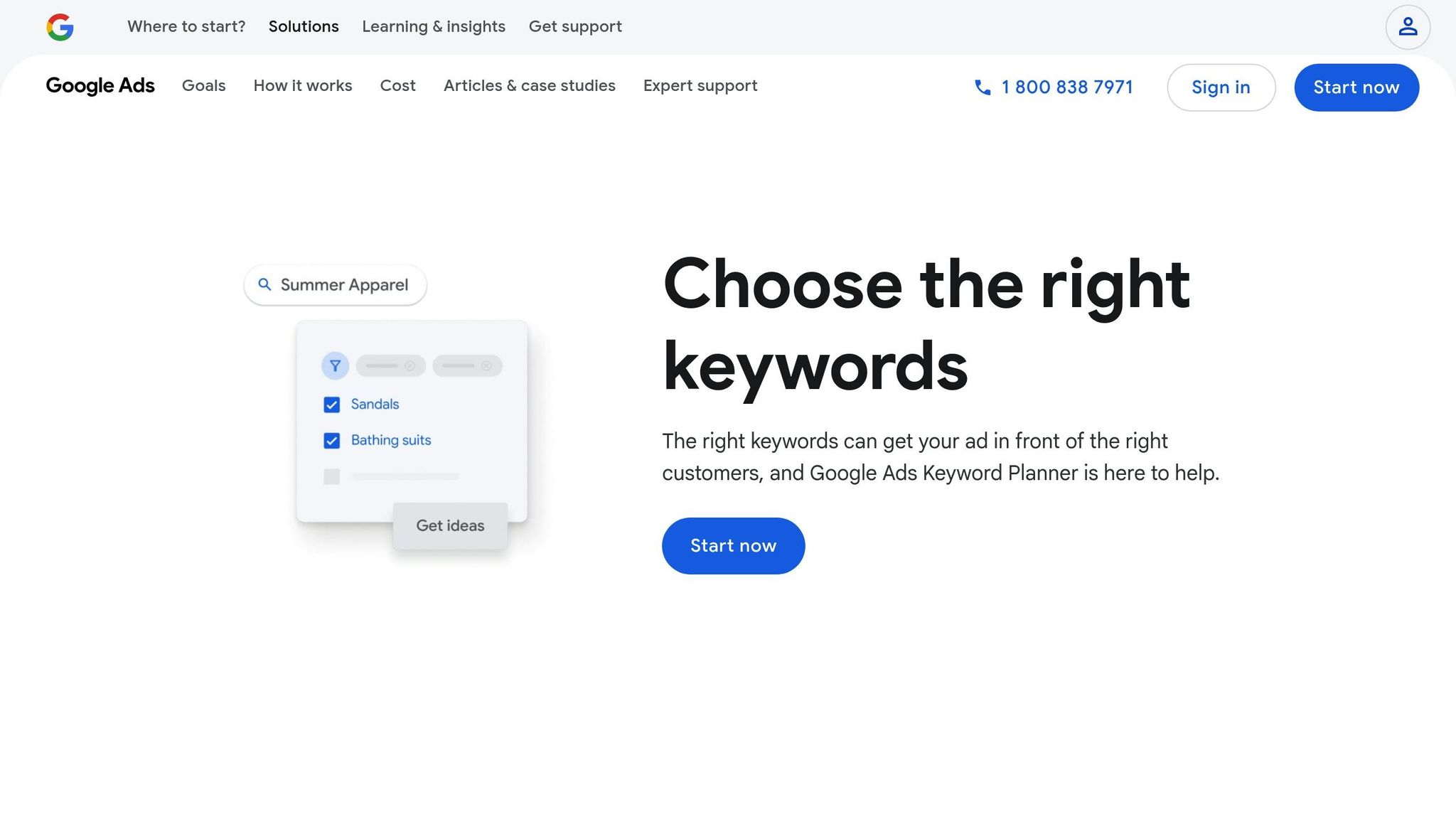
1. KWHero
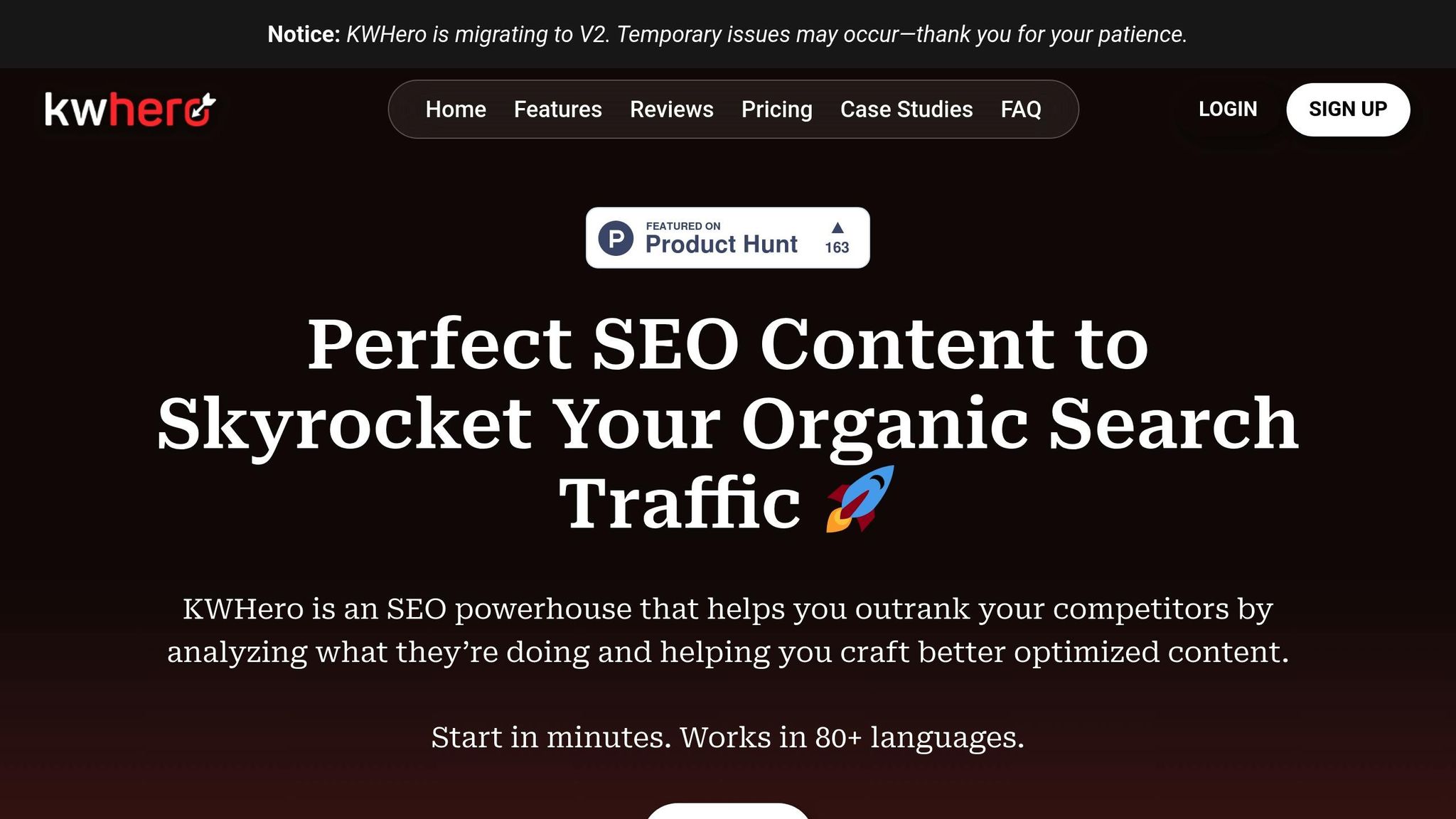
In the ever-changing world of SEO, tools like KWHero are setting the stage for smarter, AI-driven strategies. KWHero combines keyword research with content creation, offering a streamlined way to produce optimized content that can compete effectively on search engine results pages (SERPs).
Key Features
KWHero stands out with its keyword clustering algorithms, which automatically group related terms. This makes it easier to identify content gaps and create a well-connected blog structure. Its natural language processing (NLP) feature extracts essential terms from Google and builds SEO-focused outlines to simplify the content creation process. Additionally, the competition analysis tool gives you insights into what’s working for your competitors, helping you refine your approach.
Marc Johnston, an affiliate marketer, highlights the tool’s impact:
"The ability to need minimal edits and NLP is what makes it different… It has become my go-to tool to write optimized content fast."
On top of this, KWHero’s keyword research module provides deeper insights into market trends.
Keyword Discovery and Depth
The keyword research module offers a variety of filtering options, such as positive and negative keywords, monthly search volume, cost-per-click data, and difficulty scores. These features help pinpoint the most effective keywords for your niche. For each keyword, you’ll find related terms, search trends, SERP data, profitability scores, and even the minimum domain authority needed to rank. With support for over 80 languages, KWHero is a great fit for businesses targeting international audiences. You can start with broad keywords and let the tool suggest more specific long-tail variations tailored to your niche.
Pricing and Affordability
KWHero offers five pricing plans to fit different needs:
- Lite Plan: $39/month ($399/year) includes 1 content analysis, 1 content plan, and 2 daily keyword lookups.
- Basic Plan: $59/month ($599/year) offers 50 content analyses, 50 AI credits, and 10 content plans per month.
- Marketer Plan: $119/month ($1,199/year) comes with 100 content analyses, 100 AI credits, and 50 content plans, making it ideal for growing businesses.
- Agency Plan: $349/month ($3,499/year) provides 300 content analyses and 150 content plans for larger teams.
- Enterprise Plan: $999/month ($9,999/year) is designed for maximum capacity, catering to organizations with extensive needs.
These pricing tiers make KWHero accessible to users ranging from freelancers to large agencies.
Targeted Use Cases
KWHero is particularly useful for content marketing and SEO agencies. For example, Web Asset Builders reported significant improvements in productivity and content quality within two months of using the tool. Mariam Rafaqat, Content Manager at Web Asset Builders, shared:
"KWhero has been a complete game-changer for our SEO workflow at WAB. In just two months we were able to redefine our strategies and now offer new, premium packages to our clients, something that wasn’t possible before."
The tool is also effective for refreshing existing content, helping articles perform better by identifying optimization opportunities. For local SEO, KWHero allows you to input location-specific keywords and receive tailored suggestions, with ongoing improvements in its local keyword research capabilities.
Currently, KWHero has a user rating of 4.0 out of 5, with many praising its efficient content generation and NLP features. However, some users have noted occasional delays in content production and updates to the keyword database.
2. ZonGuru
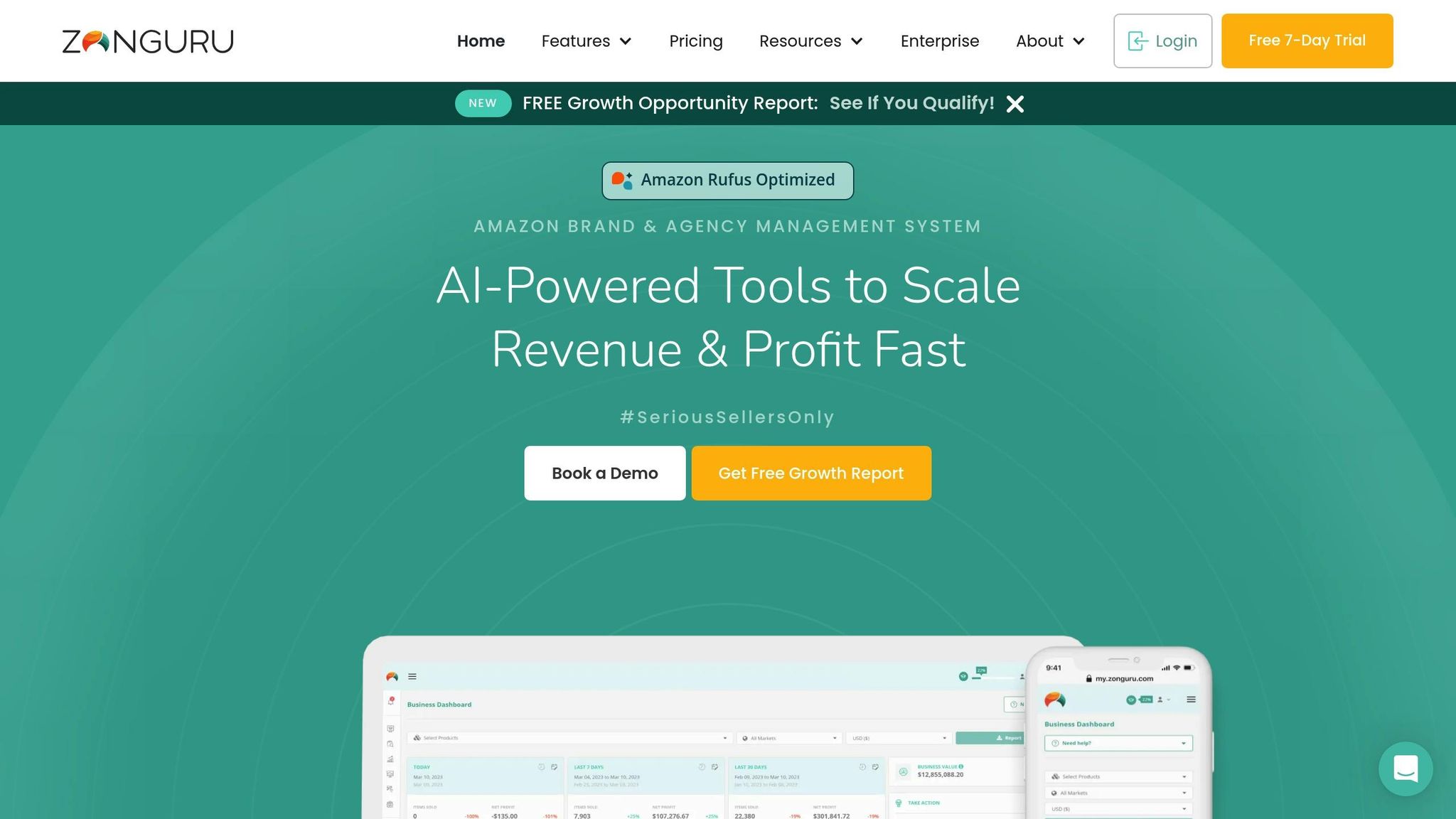
ZonGuru is a specialized platform tailored for Amazon sellers, offering tools designed to enhance niche keyword research strategies on the competitive marketplace. Unlike broader keyword tools, ZonGuru relies on Amazon-specific data, making it particularly useful for sellers targeting niche markets within the platform. Let’s dive into the tools ZonGuru provides to help sellers refine their keyword strategies.
Key Features
ZonGuru’s Keywords on Fire tool is a standout feature that identifies buyer keywords driving competitor sales. It provides essential metrics like search volume, revenue, PPC bid estimates, competitor rankings, and a score (ranging from 0–100) to help sellers quickly assess keyword potential. The Keyword Tracker monitors up to 50 keywords over a 30-day period, while the Niche Finder employs multiple filters to uncover high-demand, low-competition opportunities.
The Niche Finder goes beyond individual keywords by evaluating entire market opportunities. With up to 18 filters, it analyzes niches based on competition, buyer demand, and revenue potential, making it easier to pinpoint profitable, low-competition products.
Keyword Discovery and Depth
ZonGuru excels in finding keywords that strike a balance between search volume and manageable competition. Its deep integration with Amazon’s ecosystem allows sellers to access detailed data points and competitor insights. This includes seeing where competitors rank for specific keywords and identifying the exact terms driving their sales.
For example, when searching for "flower box holder", ZonGuru’s Keywords on Fire revealed a combined revenue of $17,813,826 generated by sellers, alongside a total search volume of 737,345. This data highlights the product’s market potential and helps refine keyword choices by applying filters like search volume and competitor targeting.
Targeted Use Cases
ZonGuru is designed for Amazon sellers across all stages of their business. Its tools cover product research, keyword discovery, and listing optimization, offering a comprehensive suite of solutions. Veronica, Head of Business Development at ZonGuru, explains:
"ZonGuru serves as a comprehensive suite of tools designed for Amazon business activities… This includes product research, validation, keyword exploration, listing optimization, monitoring alerts, and even assisting in acquiring reviews."
The Listing Optimizer helps sellers fine-tune titles, bullet points, and descriptions for maximum impact. Additionally, the Chrome extension integrates seamlessly with Amazon, offering product research and validation insights directly within the platform.
For sellers targeting seasonal products, ZonGuru’s Sales Spy tool uncovers seasonality trends, while the Love-Hate tool analyzes customer feedback to guide keyword strategies and improve product positioning.
Pricing and Affordability
ZonGuru highlights its commitment to accurate data, supported by partnerships with Alibaba and Amazon. The platform states:
"ZonGuru aims to provide the most accurate data and estimations in the industry. As official partners with Alibaba and Amazon, we have access to the best data sources in our industry to help reach our goal."
Although specific pricing details aren’t provided, ZonGuru positions itself as an all-in-one solution. By combining tools for product research, keyword analysis, and listing optimization, it may help sellers save money compared to using multiple standalone tools.
3. Ubersuggest
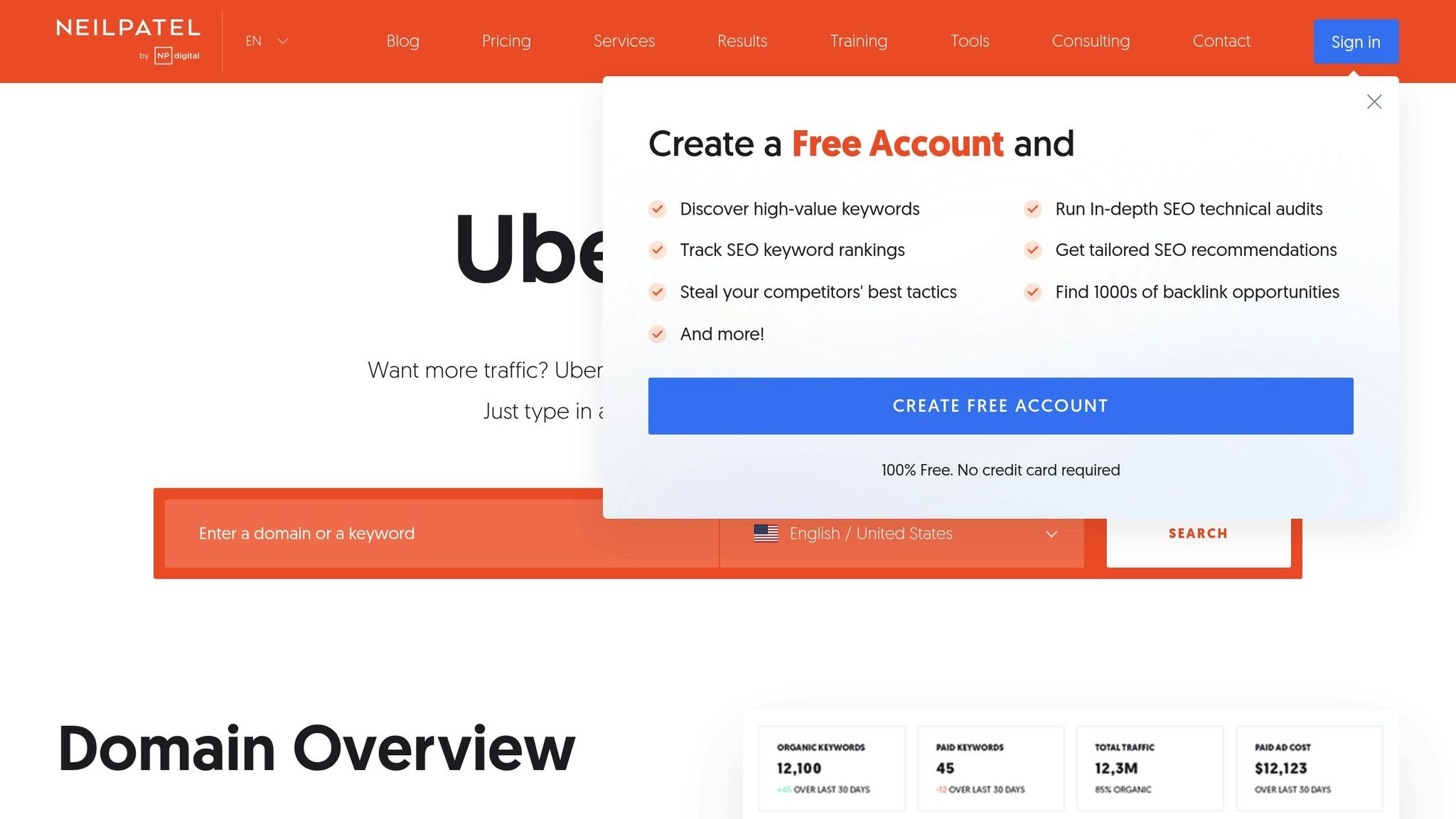
Ubersuggest is a budget-friendly tool designed for niche keyword research, packed with a variety of SEO features to help identify long-tail keywords and spark new content ideas. It’s particularly useful for businesses aiming to target specific market segments.
Key Features
Ubersuggest provides several tools to uncover keyword opportunities:
- Keyword Ideas: Offers suggestions based on seed keywords, categorized into related terms, questions, prepositions, and comparisons.
- Keyword Overview: Displays critical metrics like search volume, cost-per-click, and SEO difficulty, helping users prioritize their efforts.
- Competitor Analysis: Tools like Keywords by Traffic and Similar Websites provide insights into competitors’ strategies, including estimated traffic and shared keywords.
- Content Ideas: Suggests trending topics backed by social media engagement, going beyond typical keyword research.
These tools make it easier to discover and prioritize the right keywords for your strategy.
Keyword Discovery and Depth
Ubersuggest excels at finding low-competition, long-tail keywords by leveraging Google’s autosuggestions. It’s particularly effective for targeting keywords with SEO difficulty scores between 0 and 40, increasing the likelihood of ranking well for niche searches. Interestingly, about 15% of Google searches each day are entirely new, and long-tail keywords account for nearly 70% of all queries.
Targeted Use Cases
Thanks to its diverse feature set, Ubersuggest is a strong choice for content marketing and SEO campaigns. It delivers targeted keyword suggestions that help businesses build authority in specific niches. This is especially beneficial for e-commerce platforms aiming to attract high-intent users. Additionally, its AI Writer tool uses advanced technology to quickly create high-quality, niche-focused content.
Pricing and Affordability
Ubersuggest stands out with its affordable pricing, making it accessible to businesses of all sizes. Plans start at just $12 per month – significantly lower than competitors like Semrush ($139.95/month) and Ahrefs ($129/month), offering savings of nearly 50% compared to similar tools. The platform also provides lifetime deals, which allow users to pay the equivalent of about 10 months of a regular plan upfront. Optional add-ons for extra features are available for just $5 per month.
| Plan | Monthly Price | Lifetime Option |
|---|---|---|
| Individual | $12/month | $120 |
| Business | $20/month | $200 |
| Enterprise | $40/month | $400 |
As SEO expert Ashley Tisdale puts it:
"Ubersuggest is a powerful tool, but it’s just one piece of the SEO puzzle. Combine it with other SEO practices like quality content creation, link building, and technical optimization for comprehensive and long-term SEO success."
The platform has also received positive reviews, earning 4.4 out of 5 stars on G2 and 4.3 stars on TrustPilot.
4. AnswerThePublic
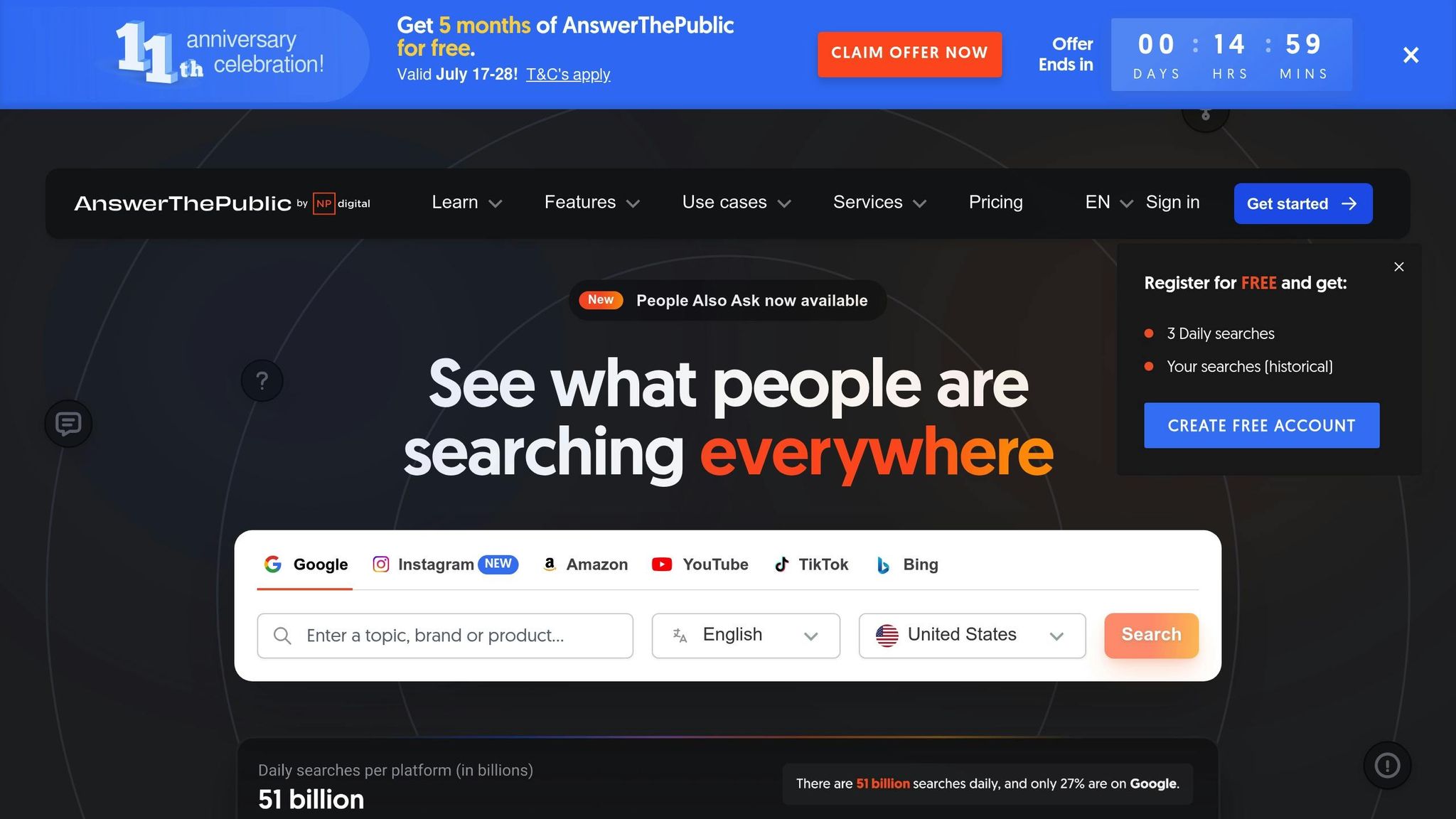
AnswerThePublic is a tool that helps you turn niche keyword insights into actionable content strategies. It organizes autocomplete data into visual keyword insights, revealing the key questions your audience is asking. This makes it especially useful for content creators aiming to understand search intent and discover content opportunities within specific niches.
Key Features
One of AnswerThePublic’s standout features is its visual diagram. This tool organizes keyword results into natural question formats – like who, what, when, where, why, and how – along with prepositions and comparisons. The radial diagram gives you a quick snapshot of the depth and breadth of topics people are curious about. Additionally, the platform provides search listening alerts, which track changes in query patterns around specific keywords. This real-time feedback can be a game-changer for content planning.
Keyword Discovery and Depth
What makes AnswerThePublic unique is its focus on question-based keywords and long-tail queries, which offer a window into user intent. The tool captures real-time search suggestions and categorizes them by intent. This is crucial, considering that over half of buyers use search terms with three or more words, and 20% of daily Google searches are entirely new. The visualizations help you align your content with the language your audience uses. Plus, the "Data View" option allows you to see queries in expandable sections, making it easy to integrate these insights into your content calendars or SEO plans.
Targeted Use Cases
AnswerThePublic is particularly effective for content marketing and audience research. Digital marketing expert Ann Handley shared her experience:
"For Content, I’ve been using answerthepublic.com. AnswerThePublic is a fantastic, beautiful way to explore questions and problems that your prospects or customers actually have. (I really like the Prepositions wheel. Try it. You’ll see what I mean.)"
Similarly, content marketers at Precision Marketing Group have found it invaluable. Kate Moore noted:
"AnswerThePublic has transformed how we deliver content strategies to our clients. Research is the foundation of optimization recommendations that actually work and AnswerThePublic makes that research easier than any other tool on the market."
The tool is ideal for creating FAQ sections, blog series, and landing pages that address specific customer concerns. By identifying the questions people ask about your niche, you can fill content gaps and map these insights to relevant pages on your site.
Pricing and Affordability
AnswerThePublic offers flexible pricing plans to cater to different users:
| Plan | Monthly | Yearly | Lifetime | Users | Daily Searches |
|---|---|---|---|---|---|
| Individual | $11 | $6.42/month | $119 | 1 | 100 |
| Pro | $57.75 | $33.67/month | $990 | Up to 3 | Unlimited |
| Expert | $116.08 | $67.75/month | $1,990 | Unlimited | Unlimited |
The $119 lifetime Individual plan is a great option for entrepreneurs and small businesses. However, for new content creators on tight budgets, the pricing might feel steep. One reviewer pointed out that the investment is worthwhile only if you’re producing content daily or weekly. Otherwise, the free plan with limited searches may be sufficient.
AnswerThePublic has received strong feedback, earning a 4.6/5 rating on Capterra. Users often praise its visual presentation and the sheer volume of content ideas it generates.
sbb-itb-880d5b6
5. Google Trends
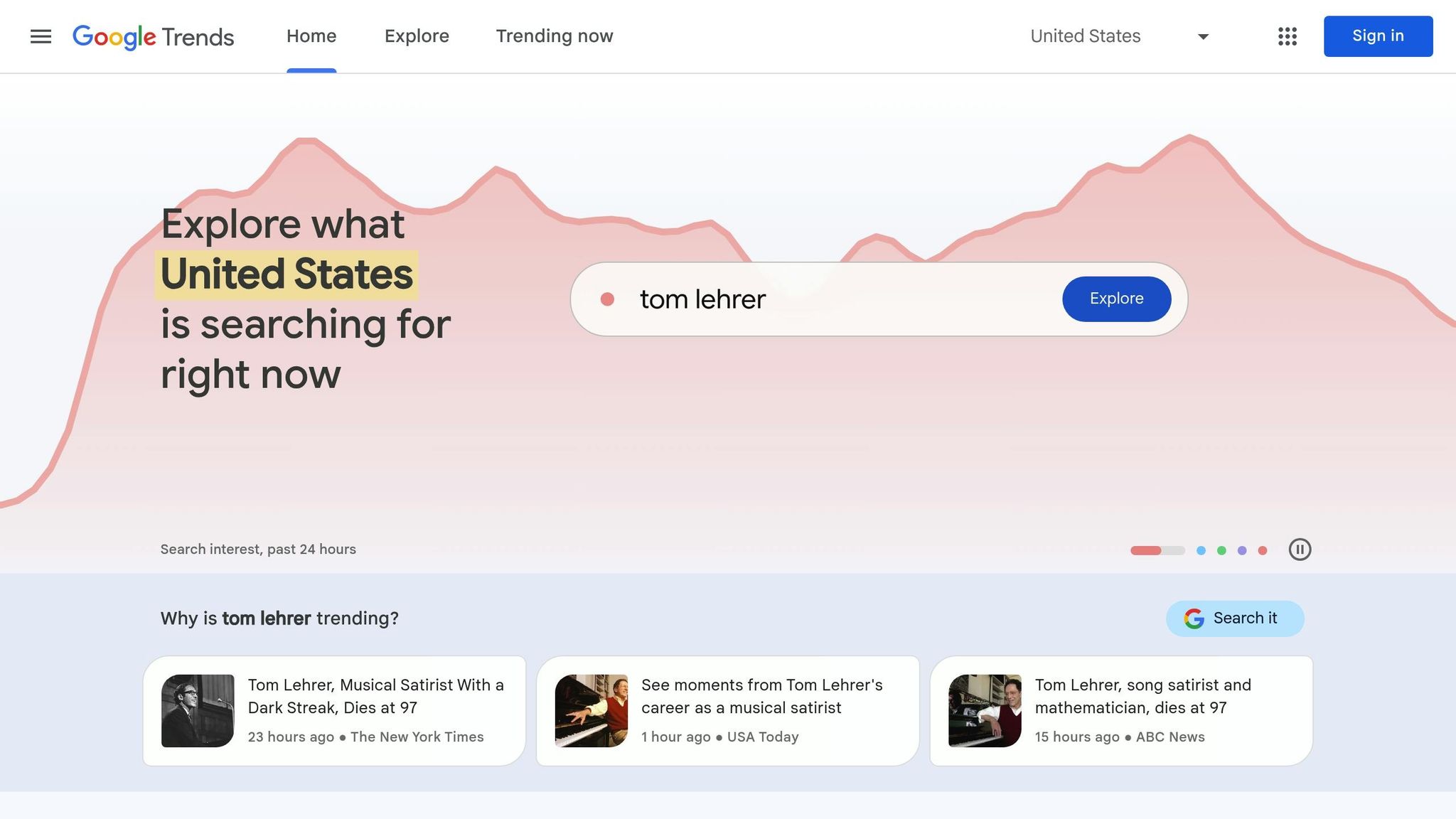
Google Trends is a free resource that offers insights into emerging trends and seasonal patterns across various markets. With 20 years of data and updates happening within minutes, it’s a powerful tool for identifying opportunities as they arise. This makes it an excellent complement to tools that focus on specific keyword data.
Key Features
Google Trends comes packed with features that make niche keyword research easier and more dynamic. The Interest over Time tool scores search interest on a scale of 0–100, with 100 representing peak popularity. The Compare feature lets you analyze multiple keywords side by side. You can also dive into Search Topics to uncover related terms or use the Search Queries function to pinpoint exact keywords. For those who need up-to-the-minute data, the real-time trending searches feature highlights both daily and real-time trends.
Understanding Keyword Behavior
One of Google Trends’ standout features is its ability to reveal seasonal trends and regional differences in search activity. Instead of showing raw search volumes, it normalizes the data on a scale of 0 to 100, reflecting interest relative to its peak during the selected time frame. This approach helps users identify when niche topics are gaining or losing traction, making it easier to plan content and marketing strategies at the right time. Additionally, you can analyze data at a global level or drill down to specific cities, which is particularly helpful for local businesses or region-specific campaigns.
Practical Applications
Google Trends shines in content marketing and local SEO. For content creators, it helps in planning seasonal pieces that align with search behaviors, ensuring your efforts meet audience demand. In local SEO, the tool provides insights for crafting region-focused content that resonates with a specific audience. It’s also a great way to validate rising keywords, allowing marketers to prioritize efforts on terms that are gaining traction. When paired with detailed keyword research, Google Trends becomes an integral part of a well-rounded SEO strategy.
Cost and Accessibility
Unlike many SEO tools that start at $99 per month, Google Trends is completely free. While it doesn’t offer the same granular metrics or depth as some paid tools, its ability to highlight trends and relative popularity makes it a budget-friendly option. For businesses with limited resources, its cost-free model combined with its trend-spotting capabilities makes it an invaluable asset.
6. SearchX
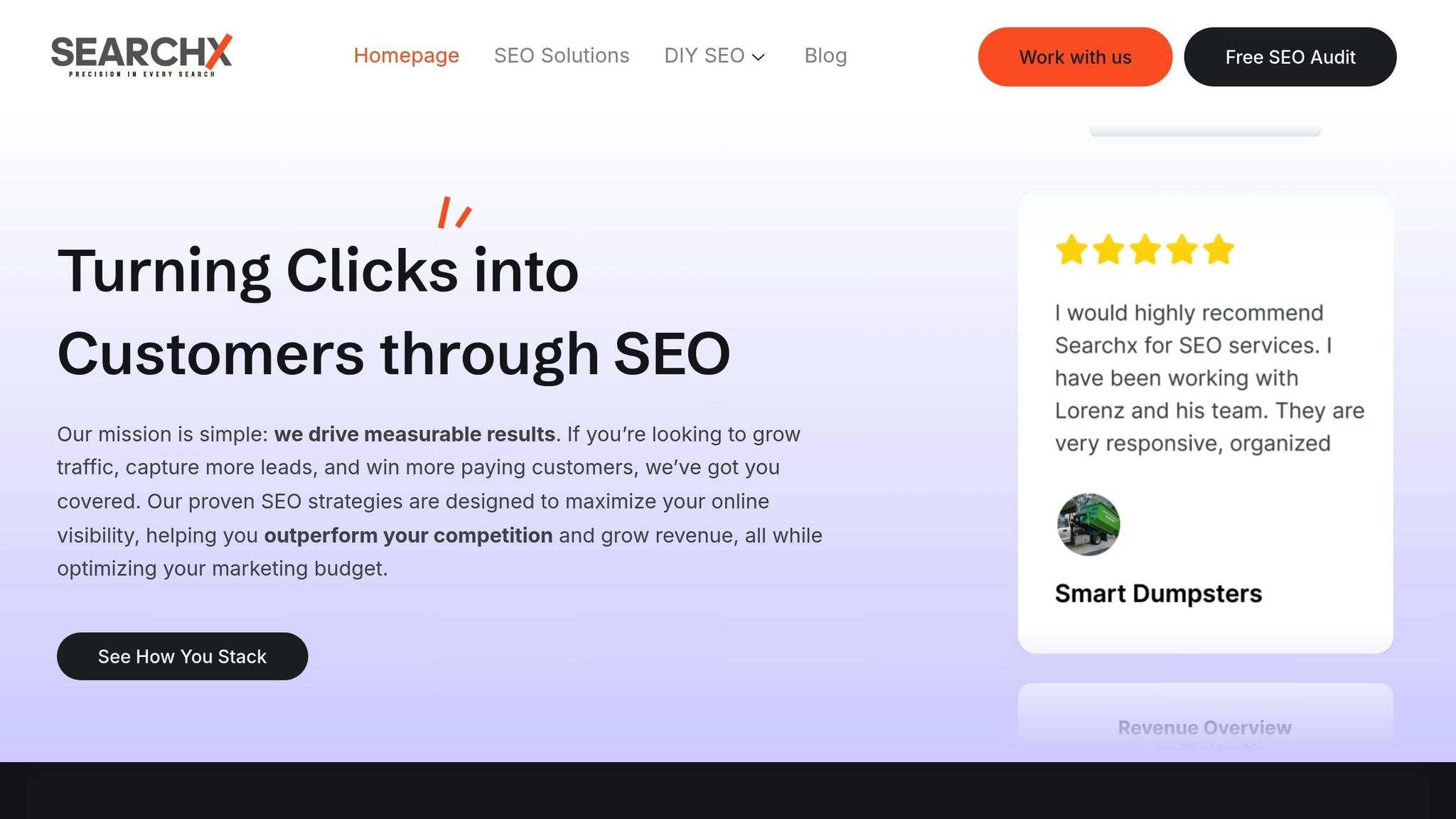
SearchX combines expert SEO advice with DIY tools, making niche keyword research more accessible for businesses. By blending professional guidance with user-friendly, self-service options, SearchX provides a flexible solution for companies aiming to fine-tune their keyword strategies without relying solely on software. This hybrid approach is the backbone of SearchX’s extensive feature set.
Key Features
SearchX’s keyword research services go beyond the basics by incorporating competitor analysis and regional insights. This approach helps identify gaps in current strategies and uncovers opportunities that might otherwise be overlooked. Alongside these services, SearchX offers a range of DIY SEO tools designed for small businesses. These tools cover keyword research, SEO audits, on-page optimization, and backlink analysis, delivering professional insights without unnecessary complexity.
Targeted Use Cases
SearchX caters to businesses with specific needs:
- Local SEO: Services include targeted keyword research, Google My Business (GMB) optimization, and local citation building. For example, businesses in Charleston, SC, have used SearchX to enhance their digital presence and increase traffic.
- E-commerce: The platform specializes in optimizing product-specific keywords and commercially focused terms. It also supports technical SEO improvements and link-building strategies to improve online store visibility.
- Content Marketing: SearchX offers tailored content creation services, producing keyword-optimized blog posts, service pages, and industry-specific content to help brands effectively reach niche audiences.
Pricing and Affordability
SearchX uses a service-based pricing structure with plans tailored to various business needs:
- Starter Plan: At $3,000/month, this plan includes up to three SEO content pieces, local listing management across 50+ directories, monthly keyword tracking, and GMB optimization.
- Growth Plan: Priced at $6,000/month, it offers 6–8 content pieces monthly, plus in-depth technical SEO audits and competitor keyword analysis.
- Enterprise Plan: Starting at $12,000/month, this package includes 10–15+ content pieces per month, along with comprehensive on-site and off-site SEO management.
For those on tighter budgets, SearchX also provides free tools like the GMB Audit Tool and Website Audit Tool, offering immediate insights to help businesses improve their online presence without additional costs.
7. Semrush

Semrush stands out as a versatile SEO platform, offering tools that cater to both broad and highly specific keyword strategies. With a massive database of 26.7 billion keywords, it’s particularly effective for businesses looking to dive deep into niche keyword research. Beyond just keywords, Semrush integrates advanced competitor analysis, making it a go-to resource for businesses aiming to understand their market landscape. Let’s break down what makes Semrush so powerful for niche keyword research.
Key Features
Semrush’s Keyword Magic Tool, combined with the Keyword Overview and Keyword Manager, delivers essential metrics like search volume, keyword difficulty, CPC, and related keyword suggestions. It even organizes keywords into clusters based on topics and intent. For added context, the platform provides visual SERP snapshots, showing elements like featured snippets, videos, and images, giving users a clear picture of what dominates search results.
The Keyword Gap tool is another standout feature. It allows you to compare your keywords with competitors, pinpointing areas where they rank and you don’t. This competitive edge is further strengthened by Semrush’s ability to segment keywords by funnel stages – helping you prioritize top-of-funnel (ToFu), middle-of-funnel (MoFu), and bottom-of-funnel (BoFu) keywords strategically.
Targeted Use Cases
Semrush’s robust features make it highly effective across various industries. Whether you’re in e-commerce or content marketing, this platform delivers actionable insights. For businesses targeting specific locations, the Local SEO toolkit is particularly useful. It includes tools for optimizing Google Business Profiles and tracking local rankings.
The platform’s impact is evident in real-world success stories. For instance, in 2019, Arkadium saw a 230% boost in organic traffic by leveraging Semrush’s SEO tools. Similarly, Landbot increased its organic traffic sevenfold, with over 75% of that growth coming from blog content optimized through Semrush.
Local businesses have also seen transformative results. Teddy Levarda, the owner of Morningside Acupuncture, highlighted the platform’s local SEO benefits:
"If I’m not in the top three results on Google Maps, New Yorkers don’t know I exist. I use Semrush to improve that locally, and it’s been explosive."
Pricing and Affordability
Semrush offers flexible subscription options tailored to different needs. The Pro Plan, priced at $139.95/month, is ideal for freelancers, startups, and small marketing teams. For growing businesses and small agencies, the Guru Plan at $249.95/month is a popular choice, while larger agencies and enterprises often opt for the Business Plan at $499.95/month.
There are additional costs for extra users: $45 for Pro, $80 for Guru, and $100 for Business plans. Semrush also offers specialized add-ons like Semrush Local starting at $30/month, the Traffic & Market Toolkit at $289/month per user, and Semrush Social starting at $20/month.
For those looking to save, annual billing provides discounts of up to 17%, making it a more economical option for long-term users.
Tool Comparison Chart
Choosing the right tool can make or break your niche SEO strategy. The table below provides a side-by-side breakdown of seven tools, highlighting their features, pricing, and ideal use cases.
Whether you’re a solo entrepreneur on a budget or managing a large agency with complex demands, this guide will help you pinpoint the tool that fits your needs.
| Tool | Starting Price | Key Features | Best For | Pros | Cons |
|---|---|---|---|---|---|
| KWHero | $59/month | AI-driven content optimization, competitor analysis, SERP insights | Content creators and bloggers | Advanced AI insights, strong content optimization | Price may be steep for beginners |
| ZonGuru | $49/month | Amazon-specific keywords, product research, listing optimization | Amazon sellers and e-commerce | Tailored Amazon tools, robust seller features | Limited to Amazon-focused tasks |
| Ubersuggest | $29/month | Keyword suggestions, competitor analysis, content ideas, site audits | Small businesses and beginners | Budget-friendly, easy-to-use interface | Lacks depth compared to higher-end tools |
| AnswerThePublic | $11/month | Question-based keywords, visual data mapping, search listening | Content marketers and bloggers | Unique question-focused approach, low cost | Limited search volume insights |
| Google Trends | Free | Trend tracking, seasonal patterns, geographic data | Anyone seeking trend insights | Completely free, real-time data | Missing search volume and difficulty metrics |
| SearchX | $3,000/month | Custom SEO strategies, keyword research, content creation, technical audits | Businesses needing full-service SEO | All-inclusive service package, expert-driven | High cost, not a DIY tool |
| Semrush | $139.95/month | Extensive keyword database, competitor analysis, keyword clustering | Agencies and established businesses | Massive database, all-in-one features | Pricey for smaller operations |
This chart simplifies the comparison, but there are a few key takeaways to consider. For example, ZonGuru ($49/month) is a standout for Amazon sellers, while Ubersuggest ($29/month) offers a budget-friendly option for small businesses looking to get started with SEO.
When deciding, think about your specific needs: Do you require in-depth keyword data, or are you looking for a tool tailored to a specific platform like Amazon? Comprehensive suites like Semrush might cost more, but they deliver a wide range of features. Meanwhile, niche tools, such as AnswerThePublic, focus on specific tasks at a lower price point. Use this guide to match your SEO goals with the right tool for your budget and team size.
Conclusion
Choosing the right niche keyword research tool can take your SEO strategy from guesswork to a precise, data-driven process that delivers measurable results. The best tool for you depends on your specific goals and budget, but the options we’ve explored show there’s something for everyone.
Free tools like Google Trends are a great starting point, especially for beginners. However, they often lack the depth needed for highly competitive niches. On the other hand, paid tools bring advanced features, larger datasets, and the reliable insights that professionals rely on.
"Growth isn’t about more eyes – it’s about reaching the right eyes." – Tom Niezgoda, CMO & Co-founder @ Surfer
This quote emphasizes the importance of precision in targeting. It’s not about casting the widest net – it’s about connecting with the audience that matters most. When choosing a tool, focus on factors like the quality of the data, keyword optimization features, free plan limitations, and whether the tool can function independently in your workflow.
If your current tools no longer meet your needs, it might be time to upgrade. With 71% of SEO professionals predicting AI will play a key role in the future of SEO, tools that integrate AI insights can give you a competitive edge.
The key to success lies in balancing high-volume keywords with niche-specific terms to drive both traffic and conversions. Start with long-tail keywords to build momentum, then target higher-volume terms as your site gains authority. Focus on keywords with low-to-moderate difficulty and transactional intent that align closely with your business.
Ultimately, the best tool is the one you use. Don’t wait for perfection – start now and refine your approach as you grow.
FAQs
How can I choose the best keyword research tool for my niche and business goals?
To pick the right keyword research tool for your niche, start by defining your business objectives and budget. Focus on tools that offer insights tailored to your niche, like keyword search volume, competition levels, and localized data specific to the US market. If you’re just starting out, free tools can work well. However, if your business is more established, you might benefit from advanced tools that include features like competitor analysis or trend predictions.
Think about whether the tool meets your particular needs, such as targeting local audiences or identifying long-tail keywords. Choose platforms that deliver reliable, actionable data to help you craft a targeted and effective SEO strategy.
What are the advantages of using AI-powered tools like KWHero for keyword research and content optimization?
AI-powered tools like KWHero offer a range of advantages for keyword research and content optimization. They take care of tedious tasks like pinpointing niche-specific keywords and analyzing competitors, streamlining the process and saving you a ton of effort. Plus, they deliver data-backed insights that can help you craft content designed to rank higher in search results while aligning better with what your audience is searching for.
With AI, you can also spot untapped opportunities, fine-tune your SEO strategies, and free up time to focus on other parts of your business. These tools are a game-changer for businesses looking to improve their online presence and achieve measurable growth in competitive markets.
How can I use Google Trends with other keyword research tools to improve my SEO strategy?
To boost your SEO efforts, begin with Google Trends to spot trending and seasonal keywords that match what people are searching for right now. This tool gives you a snapshot of which topics are currently popular and when they’re most relevant.
Once you’ve gathered this initial data, take it a step further by using a comprehensive keyword research tool. These tools let you dig into metrics like search volume, competition, and keyword difficulty. Combining the real-time insights from Google Trends with detailed keyword analysis allows you to zero in on keywords that not only align with current trends but also support your long-term SEO strategy. This approach helps you craft targeted, timely content that enhances your site’s visibility and performance.




